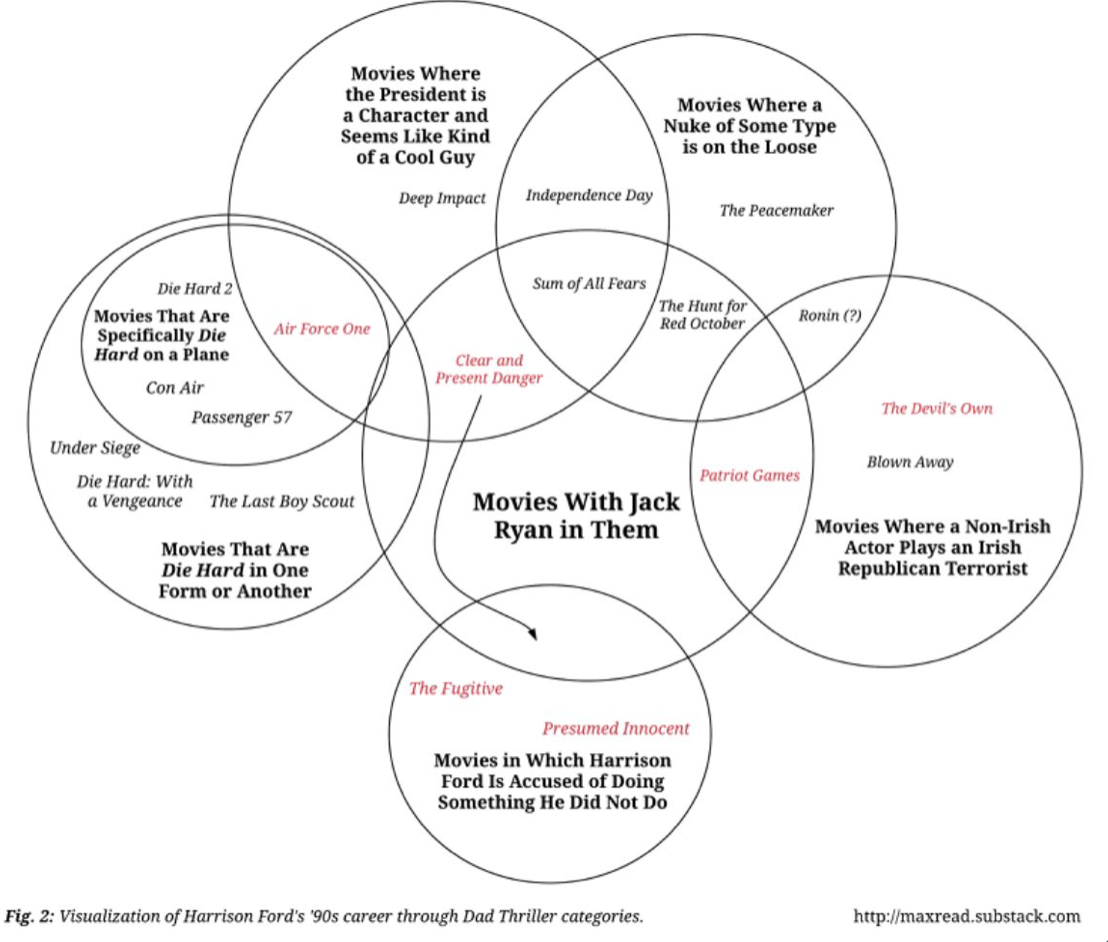Because I'm not doing separate posts for albums or films or telly this year, I thought obliged to produce a bit more end-of-year CONTENT for my dear readers.
And it occurred to me that while I've read an embarrassingly small number of books during the last 12 months, I have perused and recommended many, many online stories.
These occur sporadically on my Twitter feed, so here - with a little bit of added article accoutrement - I present you with a lovely long list of my favourites.
I should say, this was inspired by Tom Whitwell's always-intriguing 52 Things I Learned list and Benji Lanyardo's hodge podge of long-reads he's collected.
It's possible that not all of these pieces were written during 2021, but the overwhelming majority were, so we'll go in a roughly chronological order as I sift through a year's worth of tweets.
Anything in bold italics is a pull quote from the story, by the way.

One of the many excellent link's from Mr Whitwell is this history lesson which links some manky sausages in Stuttgart to what is now arguably the world's deadliest and most expensive substance - from the discovery of Botulism to the popularity of Botox.
To grow, Botulinum spores require a low salt, oxygen free environment, with low acidity, enough water, access to protein and a few other nutrients. The inside of a piece of cooked meat is ideal, but so is the inside of many canned foods if they are not processed adequately. As a result, botulism nearly derailed the nascent food canning industry completely, with cases becoming increasingly common as the industry expanded in the early twentieth century. It was not until the 1920s, when Karl Frederick Meyer, a brilliant infectious disease specialist working for the US National Canners Association, formalised sterilisation and temperature control techniques to combat the threat of botulism. Meyer, who also worked on vaccines, disease epidemiology and milk processing, is a largely unheralded hero of global public health. Many consider him the twentieth century’s Pasteur, and his work doubtless saved millions of lives.
Properly fascinating stuff, by an author I'd never heard of before - Anthony Warner - who is actually a chef by trade and training.
A bit of a rambling one next, but enjoyable nonetheless from Max Read, on his theory of the Dad Thriller as a movie sub-genre.
It's really all about the excellent graph work he's gone to in an attempt to prove his point.

I should say that the majority of these recommendations are those that I have come across as recommendations from people I follow on the internet.
Where some bought Pelotons or got into baking bread during the Covid-19 restrictions, I seem to have just signed up for email newsletters, as many of my favourite journos have migrated across to different platforms and decided to go direct-to-consumer.
I shall try to give them their dues where I can remember, but suffice to say, big-up all the researchers, writers, sharers and freelancers keeping me entertained in the dark while I wait for my son to fall asleep.

One of the things preoccupying many of those that email me regularly has been the rapid expansion of crypto, blockchain and NFTs.
As a former tech journalist myself, I have some opinions on these things, but as I thankfully no longer have to cover them on a daily basis, I'm not entirely sure how to feel.
One of my favourite recent analyses of the trend is by someone similarly intrigued and sceptical, but crucially, far more intelligent and willing to engage. Will Wilkinson dives right in, digs under the hype and actually finds some genuine value. Inevitably there are a few blindspots, but this is one of the better - and more readable - opinion pieces covering these divisive topics.
The urge to rationalize tuning out is surely amplified by the fact that laser-eyed online crypto bros are insufferable dicks. But it’s not simply that they’re insufferable. It’s also that a bunch of them are getting ridiculously rich, which is insufferably insufferable, and raises the anxious specter of FOMO to boot. There’s real comfort in the idea that crypto’s nothing but a faddish planet-wrecking house-of-cards scam; it’s a buffer against nagging regret, or a sense of obligation to learn something — a fate which might beset us were we to suspect that this stuff could be legit, genuinely innovative, and part of a transformative technological, financial, and cultural paradigm-shift.
Someone I used to pitch (occasionally successfully) to - former Resident Advisor editor Todd L Burns - recently started a sort of 'inside baseball' newsletter about music journalism.
There have been many highlights - not least this lengthy treatise from Quietus co-founder John Doran - but I really like his Notes on Process bit, where he annotates one of a writer's old articles along with them in a Google Doc. The best of these was with dance music documentarian Simon Reynolds, reflecting on his classic retelling of the epic Castlemorton rave by working through his original first draft. Geekily fascinating for a frustrated music writer like me.
While we're talking about Mr Energy Flash, I also really enjoyed this early investigation into all things techno, resurrected from 1992 on his personal blog.
A pop historical analogy: in the Sixties, British groups like The Stones, Yardbirds, Cream, listened to Robert Johnson, Muddy Waters, etc, then created their own stylised version of the blues. Then a new generation of bands, raised on white blues and ignorant of the original Black American music, arose with their own coarsened, monstrously exaggerated version of its lust and aggression. They called it "heavy metal". In the mid-Eighties, urban blacks in Chicago and Detroit, inspired by Kraftwerk and DAF, created their own version of Teutonic electronic dance music. By the early Nineties, a new generation of white European kids, ignorant both of Kraftwerk and the disco tradition, emerged with their own brutal, simplistic version of electronic dance. And they called it "hardcore".

Another newsletter shout-out now, this time for the as-yet-unsubscribed-to magazine The Fence, which are still nice enough to send out some snippets and interesting URLs to feast on each week.
They linked to some solid reportage from the journalistic institution that is Reuters, covering the bravery of Myanmar's youth in trying to overthrow the latest military junta.
Talking of exemplary journalism, I'd say at least half of the long-form stuff I read comes from one of The Guardian, The New Yorker or The Atlantic - so here's a few recent ones well worthy of mention.
Hedge funds have become a bit of a byword for the worst of financial services, and having touched upon the industry when I covered pensions back in the day, I'd say they're not all evil.
But - and it's a big butt - they are by design about ruthless as possible when it comes to the profit motive, using all the nastiest tricks to 'sweat their assets' and squeeze every buck out of a portfolio. This look into one of the best/worst in the game, Alden Global Capital, by McKay Coppins is especially infuriating as they seem to specialise in gutting America's hallowed newsrooms.
Another cracking article in The Atlantic was this one by David Brooks, reconsidering his book Bobos in Paradise, and why when the creative class was supposed to foster progressive values and economic growth, all we got was resentment, alienation and endless political dysfunction.
The modern meritocracy is a resentment-generating machine. But even leaving that aside, as a sorting device, it is batshit crazy. The ability to perform academic tasks during adolescence is nice to have, but organizing your society around it is absurd. That ability is not as important as the ability to work in teams; to sacrifice for the common good; to be honest, kind, and trustworthy; to be creative and self-motivated. A sensible society would reward such traits by conferring status on them. A sensible society would not celebrate the skills of a corporate consultant while slighting the skills of a home nurse.
Pretty sure that last one was one of the many fine recommendations made by the site-crawler extraordinaire Matt Muir, who's been curating the wonderful weekly Web Curios mailer on and off since about 2010.
I click, read and pass off as my own good taste so many of Matt's links that I forget which are of his finding, so it's probably best to assume about a third of this post deserves the correct attribution.

One of the most annoying things I frequently see on Twitter and Facebook is the 'why aren't the mainstream media [usually the BBC] covering this?' posts, indulging whichever fringe issue the person is concerned about.
With that in mind, while reading this superb piece by Ed Caesar, I found myself wondering, why haven't I heard about this before? in a very similar way. To be fair, nobody needs another thing to worry about right now, but this decaying supertanker off the coast of Yemen - holding more than a million barrels worth of oil - has the potential to be such a massive catastrophe, that it does seem amazing more hasn't been made of it.
And now for the first of several Guardian articles - for all it's faults, still the website I read every morning - this one detailing the life of Paul Alexander, one of the last remaining Polio victims dependent on an iron lung. Prescient stuff given our current fight against another deadly outbreak.
With the decline of the disease, and the visual reminders of it hidden away in a handful of homes and care facilities, across much of the western world the terror of polio faded from collective memory. “You can’t believe how many people walked into my law office,” Paul said, “and saw my iron lung and said: ‘What is that?’ And I’d tell them: ‘It’s an iron lung.’ ‘What does it do?’ ‘Breathe for me.’ ‘Why?’ ‘I got polio when I was little.’ ‘What’s polio?’ Uh oh.” David Oshinsky, the author of Polio: An American Story, believes that the success of vaccines in eradicating so many deadly diseases is precisely why the anti-vaxx movement has gained ground in recent years. “These vaccines have done away with the evidence of how frightening these diseases were.”
Also oft-linked-to by my favourite newsletter-senders is the London Review of Books, which is full of informative polemics by intelligent types. I particularly enjoyed this excoriation of Peter Thiel by David Runciman.
He’s like a cross between Joe Pesci in Goodfellas – a man who will stab you in the eye with a ballpoint pen if you cross him – and Richard Branson, another so-called entrepreneur who makes most of his money by capturing state-controlled contracts (Virgin Rail, Virgin Atlantic, Virgin Media). Branson, unlike Thiel, is a bit of a hippy and mouths most of the liberal pieties, including about climate change. But it doesn’t really matter what the philosophy is. The business model is the same: get as close as you can to the people who control the protection rackets. Unregulated markets aren’t opposed to state capitalism. They are the means by which capitalists make the most money out of the state. One more movie character I was reminded of when reading about Thiel is Keyser Söze, who says at the end of The Usual Suspects: ‘The greatest trick the Devil ever pulled was convincing the world he didn’t exist.’
Another one in the same vein is Mark O'Connell's enjoyable takedown of Jeff Bezos' and Amazon's impact on the world.
Slightly more objective, but similarly devastating, is this piece by Dan Kois, who was on the inside of the hype machine behind what turned out to be the Segway - a seemingly perfect distillation of what's wrong with the Silicon Valley, then and now.
An ideal companion in terms of tech hyperbole comes in the form of Sophie Elmhirst's long read about how some crypto-bros bought an old cruise ship and tried to turn it into a libertarian utopia on the high seas.

The Verge have also been doing some fine work this year. I particularly enjoyed/was dismayed by this piece by Monica Chin suggesting that the generation which have grown up with Google and the cloud use computers in a fundamentally different way than those who came before them - unaware, it seems, of how to save to/open from/organise files into folders.
Also, fair play to them for putting their policy about 'on background' comments on the record and exposing some of the more egregious breaches of previous policy by tech-sector comms teams.
While we're doing a bit of journalistic navel gazing, I thought this was a good point, well made by Dorian Lynskey on the pressures that have made genuinely, savagely critical reviews almost a thing of the past. While he focuses on film critics, the same can certainly be said for music writers too - something which Shawn Reynaldo has picked upon in his excellent First Floor newsletter.
In addition to keeping me up to date with the best releases, Shawn's also a great trend-spotter and interviewer; something demonstrated by picking up on the troubles within one of the finest record labels of recent times - DFA. Noticing that he wasn't getting the usual promos from lynchpin Jonathan Galkin, he messaged the co-founder, and the ensuing interview revealed just how dysfunctional the company apparently helmed by LCD Soundsystem frontman James Murphy has become.
While I'm off piste into more niche areas of interest, a quick boost for this article that distills some of the things I've been thinking about skiing for a while now. Long a sport and surrounding industry that is dominated by the white and wealthy, Jessi Hackett does a good job of questioning the ingrained norms and language that continue to put off people from other backgrounds and races.

Another of my favourite genres of long read is the deep dive into something you wouldn't naturally assume to be that interesting.
Perhaps a perfect example is Simon Usborne's assessment of the enduring popularity of Henry the Hoover. Get involved; you won't regret it.
Meanwhile, like I said in my tweet at the time, I think this is sort of the perfect Wired feature - a specific technical issue that reveals a far wider trend and more fundamental issue - well researched and surprisingly fascinating; bravo Andy Greenberg.
Much of the same could be said for this article getting you up to speed on the superlative substance that is Hagfish slime. You're welcome.
Another good example is this mind-bending piece on the billion-dollar industry behind food flavourings and aromas. I mean, who knew Coke is supposed to be a citrus-based beverage?
Even the most familiar products can bewilder us. Coca-Cola, for instance, is primarily a citrus beverage, its flavor derived from lemon, orange, and lime oils, combined with vanilla, cinnamon, other spices, and corn syrup. Its flavor has little in common with the astringent-tasting kola nut, from which it takes its name, and its caramel coloring is largely imposed. For many people, describing Coke’s flavor as a combination of different parts is nearly impossible.
Elsewhere, Buzzfeed also goes deep into the guy behind most of the poppers being sold across the US - and the interesting legal grey area that means they're still available to buy in shops.

Props to Popbitch (where else?) for that link and for helpfully providing the - considerably shorter and less glamorous - UK version of the same story. Good on them too for upping the frequency of their legendary newsletter during the lockdowns.
While we're on the bastarding super flu, there have been a few properly fascinating pieces on how the scientific community has responded so quickly - this being chief among them for me.
For the human stories behind the horrifically-numbing death toll numbers, a debt goes to the brilliant Sirin Kale for her Lost to The Virus series. To be fair, the amount of times I've read something excellent on the Guardian, then scrolled back up to find her byline, shows just what a talent they've got - this on the poor punters who've lost out to crypto gambling and this on how the woo-heavy wellness industry were among the first to turn their back on Covid science are just two worth reading.
While we're on the overarching subject, as the disappointing son in a familial line of scientists, I feel like the least I can do is promote good science and good science writing. This article is both. Not quite Occam's razor, but proof that using tried and tested methods to work towards the solution to a problem (in this case, all those severed feet washing up on the Pacific Northwest coast a few years ago) makes more sense than aliens/mass-murderers/conspiracy theories/etc.
And to conclude the loosely-themed pandemic section, a prescient essay penned by David Graeber shortly before his death, arguing this viral shitshow must be grasped upon as a chance for fundamental societal change. We can but hope.
Why not instead, once the current emergency is declared over, actually remember what we’ve learned: that if “the economy” means anything, it is the way we provide each other with what we need to be alive (in every sense of the term), that what we call “the market” is largely just a way of tabulating the aggregate desires of rich people, most of whom are at least slightly pathological, and the most powerful of whom were already completing the designs for the bunkers they plan to escape to if we continue to be foolish enough to believe their minions’ lectures that we were all, collectively, too lacking in basic common sense do anything about oncoming catastrophes.
And now for something completely different. Down under to New Zealand for a heart warming tale of two inmates who swapped manufacturing meth to making yoghurt. Lovely stuff.
Another of my favourite genres of long reads is the random, brilliant blog. Usually best when, like this one, it's the recollections of someone with some very specific expertise or set of anecdotes to impart. Mark Saunders is/was a brilliant engineer and producer, who stumbled into the gig of getting Tricky's lauded debut album Maxinquaye to fruition. His first hand tales of the young Bristolian's infuriating brilliance are a joy to be told.
Same same, but different, is this little peek into a fleeting subculture fostered by a fruity farmer. More power to the mavericks trying to swim against the tide of mediocrity and have a bit of fun for once.
It was quite an idyllic setting really. I mean quite amazing to think down on the Weald of Kent you had hundreds of queens dancing and roaming about.
While we're on misty-eyed reminiscence, for my generation, it was Simon Amstell and Miquita Oliver that cut through the thick forest of bland 90s pop with their machetes of sassy snark. This interview with the latter made me pine for the proper Saturday morning telly of my youth.
One more tenuous link before we wrap this up - sticking roughly with music - another writer who deserves some specific praise is Gabriel Szatan, who's been writing informatively and entertainingly for many of my favourite outlets for some time now. I've happily lost many minutes scrolling through his detailed and revealing retrospectives of The Avalanches' Since I Left You and Daft Punk's Discovery.
Fair play to you for getting to the end of this thing. And if you've actually clicked through and tried to read any/many of these articles, then this parody site does a good job of distilling just how unpleasant it can be to scroll down a long piece on mobile or desktop.
As someone who writes almost exclusively online I have to apologise for the increasingly ad-ridden, disclaimer-ruined infrastructure of media websites. So long as we continue with the current ways of monetising content and regulating the web, I can't see it getting better anytime soon; but I suppose it's all quite a good promotion for physical magazines and papers eh?
And a quick PSA before you go...


